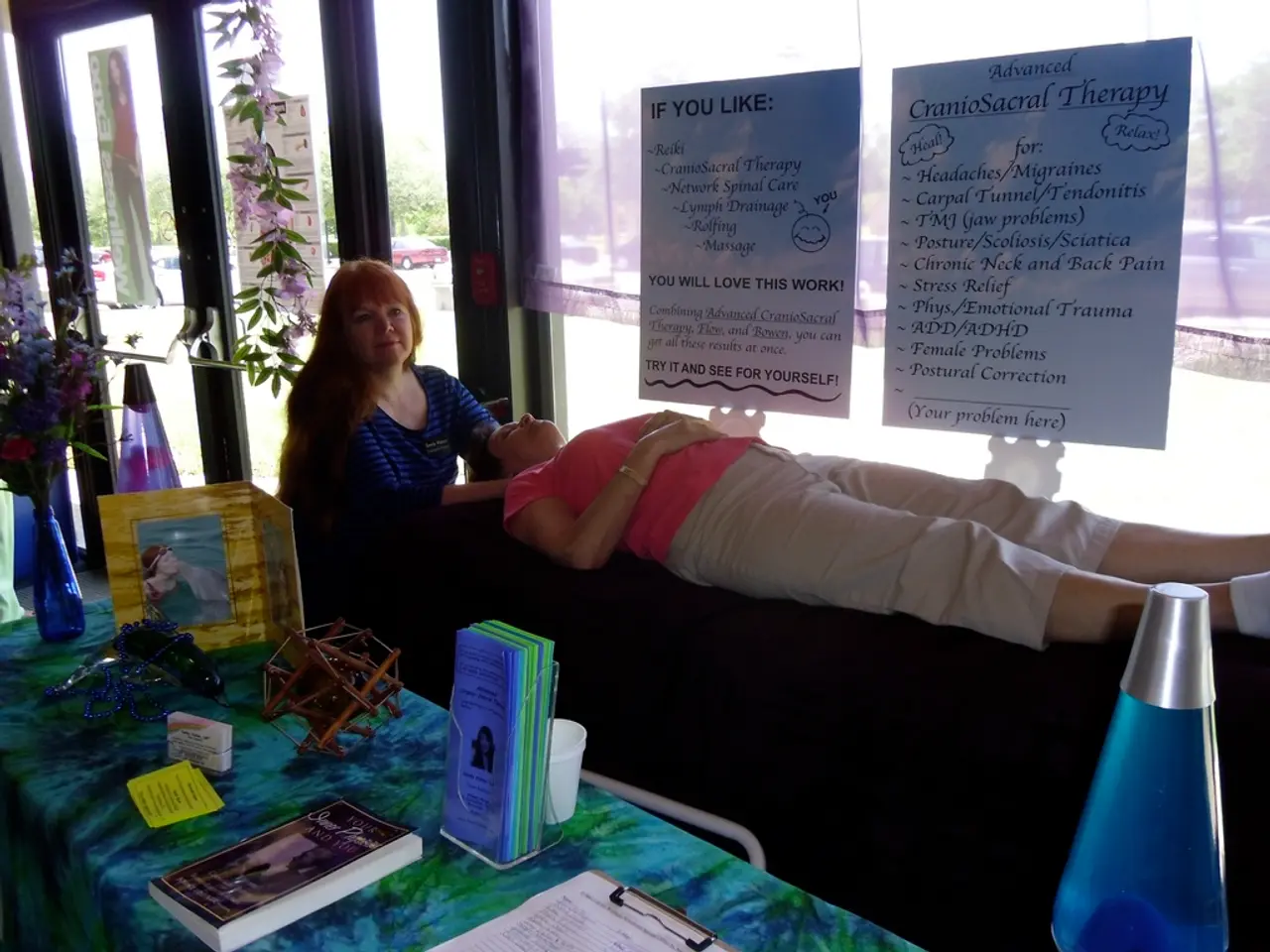Strategies to Combat Anxiety Without Medication: Effective Methods to Consider
Anxiety can be managed effectively without the use of medication, according to mental health professionals. With the right guidance and a personalized plan, individuals can learn to cope with their anxiety using evidence-based techniques.
If anxiety feels constant, overwhelming, or begins to affect sleep, work, or relationships, it's time to seek help from a mental health professional. A mental health professional can guide you through various non-medication strategies, such as talk therapy, breathwork, improving sleep, and physical activity.
Talk therapy, particularly Cognitive Behavioral Therapy (CBT), is highly effective in managing anxiety. CBT helps individuals reframe negative beliefs, reduce avoidance behaviors, and improve coping strategies. Grounding techniques, like the 5-4-3-2-1 method, can also provide immediate anxiety relief by engaging the senses.
Breathwork, including diaphragmatic breathing and the 4-7-8 breathing method, helps calm the nervous system by increasing oxygen flow to the brain and reducing stress. These exercises promote relaxation and are useful in managing anxiety throughout the day and at night to improve sleep quality.
Quality sleep is crucial for anxiety reduction. Techniques such as mindfulness meditation, progressive muscle relaxation, and journaling can alleviate nighttime anxiety and improve the ability to fall asleep. Consistent, restorative sleep has a positive impact on anxiety levels.
Physical activity is another potent approach. Regular exercise reduces anxiety symptoms by releasing endorphins and improving overall mental and physical health. Exercise has also been shown to improve sleep in people with anxiety-related insomnia.
Mindfulness and meditation practices enhance emotional resilience and reduce symptoms of anxiety by encouraging present-moment awareness and decreasing negative thought patterns. While meditation alone may not fully replace other active treatments, it is a valuable component of a holistic anxiety management plan.
In summary, combining talk therapy, controlled breathing exercises, good sleep hygiene with relaxation techniques, physical activity, and mindfulness can effectively reduce anxiety without medication. For persistent or severe anxiety, professional guidance may be necessary to tailor these approaches optimally.
Techniques like talk therapy, mindfulness, and lifestyle adjustments can help build lasting coping skills. Just 20-30 minutes a day of movement can help regulate anxiety levels. Even a few sessions with a trained psychologist can make a real difference in managing anxiety.
Acceptance and commitment therapy (ACT) teaches living with anxious thoughts without control. Establishing a consistent sleep routine, limiting screen time before bed, and creating a calm sleep environment can improve sleep quality. Exposure therapy helps individuals face feared situations in a safe, supportive way. Breathwork techniques like box breathing or 4-7-8 breathing can activate the parasympathetic nervous system, lowering heart rate and reducing tension. Psychodynamic therapy explores emotional patterns and past experiences contributing to anxiety.
For those looking for someone who understands the nuances of anxiety and non-medication treatment options, connecting with a qualified therapist can be a powerful first step. Robert Haynes, a psychology graduate from the University of Hertfordshire, has a keen interest in the fields of mental health, wellness, and lifestyle. Non-medication approaches are effective for situational, mild to moderate anxiety.
- Mental health professionals suggest that non-medication strategies, such as talk therapy and mindfulness, can be highly effective in managing anxiety.
- In addition to talk therapy, controlled breathing exercises like diaphragmatic breathing and 4-7-8 breathing method help calm the nervous system and reduce stress.
- Good sleep hygiene with relaxation techniques like mindfulness meditation, progressive muscle relaxation, and journaling can alleviate nighttime anxiety and improve sleep quality, impacting anxiety levels positively.
- Regular exercise is another potent approach in managing anxiety; it reduces anxiety symptoms by releasing endorphins, improving overall mental and physical health, and enhancing sleep quality.
- Mental health professionals offer various non-medication therapies, such as acceptance and commitment therapy, exposure therapy, psychodynamic therapy, and mindfulness practices as part of a holistic anxiety management plan.
- For those seeking alternatives to medication for situational, mild to moderate anxiety, connecting with a qualified therapist who specializes in mental health, wellness, and lifestyle can provide valuable guidance on implementing these evidence-based techniques.




